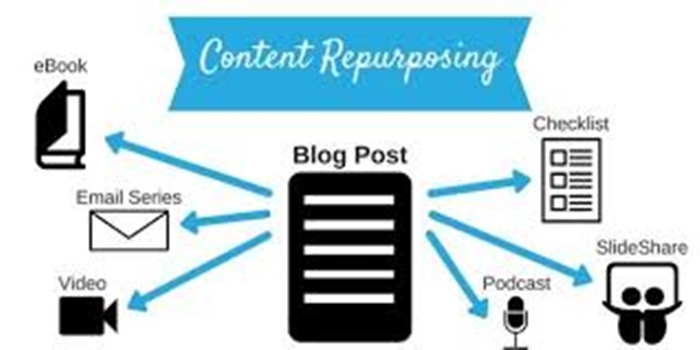In this article, we discussed the meaning of repurpose content, the benefits. Furthermore, we also talked about the ways to repurpose content.
Definition
Repurposing content is the process of taking existing content and transforming it into a new format or presentation to reach a different audience or serve a new purpose. It’s also known as content recycling.
To repurpose content means to take a piece of existing content (e.g., blog content, visual content, etc.) and rework it to meet the needs of a different subset of your audience. For example, tweaking a blog post into a more conversational format and then turning it into a podcast or video.
The Benefits of Repurpose Content
benefits of repurposing content, including:
It increases your reach
It allows you to be omnipresent
It makes your content shareable
It reduces the time you spend creating content
It gives you the first mover advantage
It makes your content ever-green
It allows you to divert your time to other things
It makes you more discoverable
It makes your message stick
It is preferred over content recycling
It gives you more chances to go viral
It allows you to be more thoughtful with your content
It diversifies your content across more channels
It prevents you from being limited by your audience’s attention span
It can increase the traffic to your sales page.
Ways We Can Repurpose Content
Here are some ways to repurpose content:
Update existing content
Add new information to old blog posts or use the latest facts and figures.
Create visuals
Turn blog posts into infographics or slideshow presentations. You can also use key takeaways from a blog post to create an infographic.
Create a campaign
Combine multiple pieces of content into a campaign, such as turning a series of blog posts into an ebook.
Create social media content
Use blog content to create social media posts, or use testimonials or statistics for social media. You can also share sound bites from videos or podcasts on social media.
Create other types of content
Turn blog posts into podcasts, or use internal data to create case studies. You can also use blog content for online courses or offer guest contributions on topics you’ve already covered.
Break up large assets
Split a large asset into smaller ones, or combine smaller pieces into one large one.
Repurpose content for multiple platforms
Turn a long video into short clips and post them on multiple platforms, such as Facebook Reels, YouTube Shorts, and Instagram Reels.
Share positive feedback
Share positive comments or feedback on your content on social media.
You can also consider repurposing content before you write. For example, you can note down what parts of an upcoming blog post you can repurpose.
Conclusion
Repurposing your existing content isn’t meant to be an another to creating new content, but rather a supplementary strategy. You can continue to create new content while at the same time giving new life to your existing, high-quality pieces and providing your audience with relevant, timeless information

